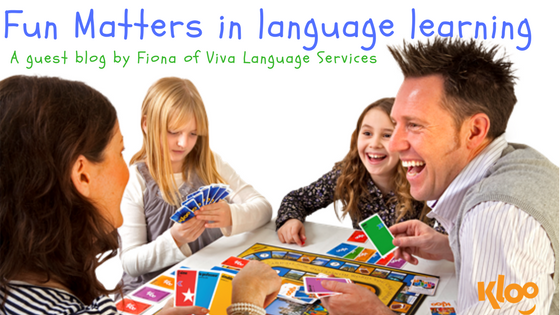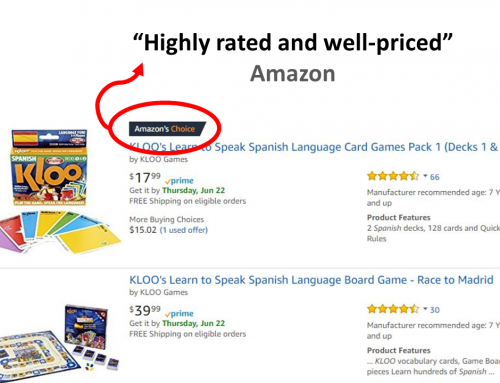How to make learning a language fun!
Learning a language does not have to be difficult, time-consuming or boring these days. If you can find ways to enjoy learning a language so that it doesn’t feel like studying, then you are more likely to stick at it for longer and be more successful. Here are 10 fun ways to enjoy learning languages:
1. Cook a recipe in the target language
Find an online recipe or a foreign recipe book with the instructions in the language you are learning. Not only will you learn the names of foods from the list of ingredients but you will also get to know the most common verbs and terms used for cooking.
Watch dishes being made by native speakers on YouTube. They talk through what they are doing step by step which is excellent listening practice. Just search for the recipe in the language on YouTube.
2. Listen to songs
Go to Spotify to find playlists of popular songs in the target language or you can create your own. You can easily find videos on YouTube or listen to online radio channels from the country where the language is spoken.
3. Learn with a friend
If you go to an evening class or are learning with a friend, this will make learning more enjoyable as you can help each other out with difficulties, practise together and encourage each other to keep going. Having some healthy competition between friends makes it more interesting!
4. Use technology
Try to maximise technology for language learning. Nowadays there are so many apps out there to help with language learning. You are spoilt for choice, so find the ones that are the most fun, addictive and easy to use. For example, Duolingo, Rosetta Stone and Busuu are the most popular to use. You can also download a flashcard app to your smart phone so that you carry it around with you every day just like a virtual phrasebook. When you have a spare ten minutes you can flick through a few cards to keep vocabulary fresh. Anki (https://www.ankiapp.com/), Memrise (https://www.memrise.com/) and Brainscape (https://www.brainscape.com/)
5. Use social media
Find people who tweet in the language you are learning every day or teachers who tweet a “word of the day”. You could also follow celebrities or famous sportsmen or women from the country where the language is spoken.
6. Watch movies
Netflix makes it easy to watch foreign films whenever you want in your own home. You don’t have to travel to a cinema to watch a foreign language film. Start with watching with the subtitles on, then watch the film again but with them switched off to see how much you can understand. For more intensive study sessions you could sit with a notebook and write down any new words and phrases you might like to learn.
7. Find online friends
You can easily find a language exchange partner online to chat with by text, email or video calling.
You can use TheMixxer (https://www.language-exchanges.org/) to find language partners over Skype.
Other language exchange websites include:
– Conversation Exchange (http://www.conversationexchange.com/)
– My Language Exchange (http://www.mylanguageexchange.com/)
The idea is to chat half the time in your native language which is what they are learning, and the other half in the language you are learning, their native language. So you help each other learn. If you can find someone that you have things in common with and who you get on well with, you will get the most out of this.
8. Find a local native speaker to chat with face-to-face
If you can find someone in your community who speaks the language then you could arrange to meet up regularly with them to practise conversation. This could be a friend, a colleague, a neighbour.
If you don’t know anyone have a look on the website Meetup.com (https://www.meetup.com/) to find a local group of people who are learning a language and arrange meet-ups to chat in the language in an informal setting.
9. Play online video games
Computer games like Minecraft, Team Fortress 2 and World of Warcraft involve group chats and working with others. You could easily search for people who speak the language you are learning. Interactive movie style games are the best ones as they are up-to-date with the TV series and are dialogue-based which will help you practise colloquial vocabulary. If you like the TV series Game of Thrones or The Walking Dead, there are games where you get to play the character and therefore carry out dialogues and you have to respond to questions to influence the story.
10. Change your phone and facebook settings to the target language
It is easy to change the settings on your phone from English to the language you are learning. This way you will get to see the terms in the language every time you use your phone or tablet. You will quickly get to know the key words for sending texts, checking your emails, sending emails, facebook terms: like, share, status, search, messages, notifications and so on.
11. Eat out in typical restaurants
Find a restaurant that specialises in the food from the country where the language is spoken or where natives own restaurants. You can practise reading the menu and ordering in the language you are learning. It is also a great opportunity to chat to the waiters and other staff to practise the language.
Whilst on holiday in the country itself you could search for restaurants where the locals tend to go. Try to avoid the restaurants in the touristy areas as the staff will just speak to you in English.
Guest blogger: Fiona
Fiona started teaching Spanish in 2005 as a hobby which later became a full-time business – “Viva
Language Services” which offers private and corporate language tuition and after school language
clubs. You can follow her on Twitter, facebook or instagram.
Website: www.vivalanguageservices.co.uk
[Links:]
Twitter: https://twitter.com/vivalanguages
facebook: https://www.facebook.com/VivaLanguageServices/
Instagram: https://www.instagram.com/vivalanguages/




















Leave A Comment